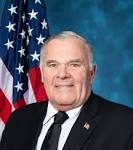By Reps. Ami Bera (D-Calif.), M.D. and Larry Bucshon (R-Ind.), M.D.Â
Despite how it sometimes looks from outside the halls of the Capitol, there are members of Congress, from both sides of the aisle, who are working together to make big, bold decisions for the future of the country. After all, that’s why people like us wanted to serve. We both ran for Congress because we wanted to work to put people before politics to solve this country’s problems, and we believed that medical professionals must be an integral part of the conversation regarding healthcare policy. As members of Congress from opposite parties, we don’t agree on every issue in health care, but we do agree on the fundamental idea that the patient should be at the center of our healthcare decisions.
That’s why we believe a permanent fix to Medicare’s fatally flawed formula for reimbursing Medicare health care providers, the Sustainable Growth Rate (SGR), is so important. Developed by Washington in 1997, this formula has seen 17 short-term patches over the last decade, threatening access to health care for millions of Medicare patients and, costing taxpayers $150 billion. However, now it looks like a broad, bipartisan consensus on real reforms that will ensure access to quality care for seniors and help us protect the Medicare promise is within our grasp.
Last year, we made unprecedented progress toward a bicameral and bipartisan agreement that unfortunately fell short within the political process. It’s imperative that this week Congress finishes the job by passing the SGR Repeal and Medicare Provider Payment Modernization Act of 2015.
As physicians, we understand why a permanent solution for SGR is necessary. Under the current formula, cuts are indiscriminate and across the board; high-quality, cost-effective doctors are penalized just as much as those who are inefficient. For more than a decade, the financial uncertainty caused by the SGR has left many doctors no choice but to reduce the number of Medicare patients they see and to delay investments in new equipment and innovative practice. Meanwhile, one out of every four Medicare patients is struggling to find a primary care physician. The Washington solution has become the problem.
Permanent SGR reform will not only ensure seniors access to care, but also has the potential to transform how we deliver health care to improve it while also lowering costs.
Models that allow physicians to coordinate care as a team to reduce costs, and to bundle payment by ailment rather than per procedure, are just two examples of innovative approaches that would be rewarded with this new reform. With SGR reform, no longer will health care only be about how many patients doctors see, how many tests and procedures they order, or how much they charge for these things. Instead, it will be about patient outcomes: fewer hospital readmissions, higher patient satisfaction, and fewer medical errors, to name a few.
Doctors have led the charge to stay focused on this path of value-based care and to move mostly away from the costly and outdated fee-for-service system. That’s why when we learned about a proposal to replace bundled payments for complex procedures, such as heart surgeries, with a costly fee-for-service system, we brought together more than 50 of our colleagues from both parties to express our concerns about the harm this change would cause. Like most doctors, we got into the profession to care for patients, not to focus on billing codes, and we want to make sure that all seniors in the Medicare system get the full attention and care from their physician that they deserve, without worrying about additional copays. We’re glad to see this addressed, and that members from both parties recognize that the first step in addressing many of our health care challenges has to be a payment system that aligns quality metrics and incentivizes high-value care. Similarly, SGR repeal and reform is exactly the kind of challenge that cannot be a victim of Washington D.C. politics. We must not fail to meet this challenge.
We know what it’s really like in the exam room, and the real consequences that inadequate and uncertain Medicare payments have on patient care. Our seniors and their physicians should not have to continue to bear the consequences of Congress’ failure to fix a problem Congress created. This time we can’t let politics get in the way of progress. With 49 million patients enrolled in Medicare and another 10,000 baby-boomers aging in each day, we have a responsibility to seize this historic occasion to pass a bipartisan SGR repeal and to right the Medicare system once and for all.Â
Bera. has represented California’s 7th Congressional District since 2013. He sits on the Foreign Affairs and the Science, Space and Technology committees. He is a doctor of internal medicine and former chief medical officer of Sacramento County, California. Bucshon. has represented Indiana’s 8th Congressional District since 2011. He sits on the Energy and Commerce Committee. He is a cardiothoracic surgeon.




